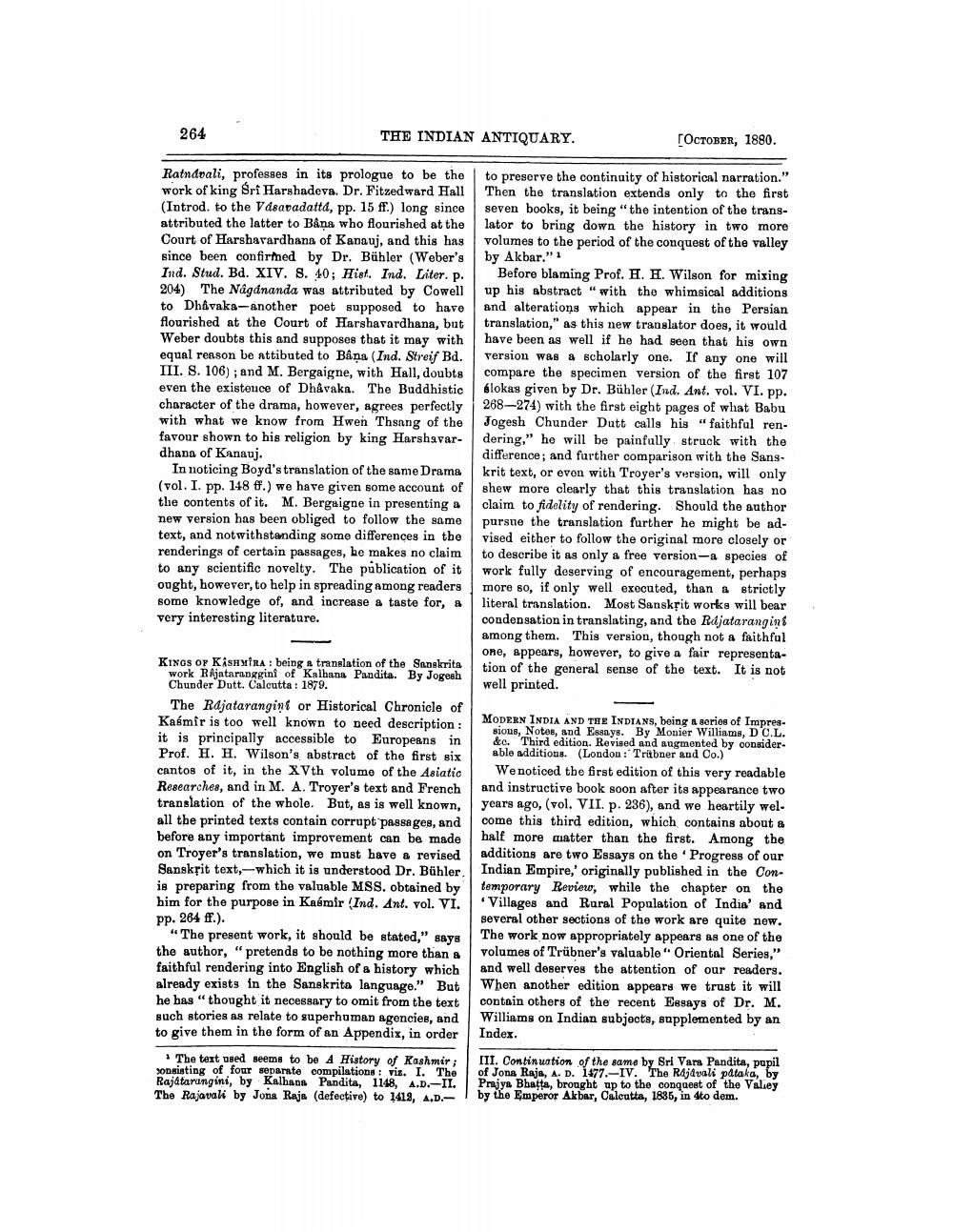________________
264
THE INDIAN ANTIQUARY.
[OCTOBER, 1880.
Ratnddali, professes in its prologue to be the to preserve the continuity of historical narration." work of king Sri Harshadeva. Dr. Fitzedward Hall Then the translation extends only to the first (Introd. to the Vasavadatta, pp. 15 ff.) long since seven books, it being "the intention of the transattributed the latter to Båna who flourished at the lator to bring down the history in two more Court of Harshavardhana of Kanauj, and this has volumes to the period of the conquest of the valley since been confirmed by Dr. Bühler (Weber's by Akbar." Ind. Stud. Bd. XIV. S. 40; Hist. Ind. Liter. p. Before blaming Prof. H. H. Wilson for mising 204) The Nagananda was attributed by Cowell up his abstract " with the whimsical additions to Dhavaka-another poet supposed to have and alterations which appear in the Persian flourished at the Court of Harshavardhana, but translation," as this new translator does, it would Weber doubts this and supposes that it may with have been as well if he had seen that his own equal reason be attibuted to Bana (Ind. Streif Bd. version was a scholarly one. If any one will III. S. 106); and M. Bergaigne, with Hall, doubts compare the specimen version of the first 107 even the existence of Dhåvaka. The Buddhistic blokas given by Dr. Bühler (Ind. Ant. vol. VI. pp. character of the drama, however, agrees perfectly 268-274) with the first eight pages of what Babu with what we know from Hwen Thsnng of the Jogesh Chunder Datt calls his "faithful renfavour shown to his religion by king Harshavar- dering," he will be painfully struck with the dhana of Kanauj.
difference; and further comparison with the Sans. In noticing Boyd's translation of the same Drama krit text, or evon with Troyer's version, will only (vol. I. pp. 148 ff.) we have given some account of shew more clearly that this translation has no the contents of it. M. Bergaigne in presenting a claim to fidelity of rendering. Should the author new version has been obliged to follow the same pursue the translation further he might be adtext, and notwithstanding some differences in the vised either to follow the original more closely or renderings of certain passages, he makes no claim to describe it as only a free version--a species of to any scientific novelty. The publication of it work fully deserving of encouragement, perhaps ought, however, to help in spreading among readers more so, if only well executed, than a strictly some knowledge of, and increase a taste for, a literal translation. Most Sanskrit works will bear very interesting literature.
condensation in translating, and the Rdjataranging among them. This version, though not a faithful
one, appears, however, to give a fair representaKINGS OF Kishaira : being a translation of the Sanskrita
tion of the general sense of the text. It is not work R&jataranggini of Kalhana Pandita. By Jogesh Chunder Dutt. Calcutta : 1879.
well printed The Rájatarangint or Historical Chronicle of Kasmir is too well known to need description :
MODERN INDIA AND THE INDIANS, being a series of Impres.
sions, Notes, and Essays. By Monier Williams, DC.L. it is principally accessible to Europeans in do. Third odition. Revised and augmented by consider Prof. H. H. Wilson's abstract of the first six
able additions. (London: Trubner and Co.) cantos of it, in the XVth volumo of the Asiatic We noticed the first edition of this very readable Researches, and in M. A. Troyer's text and French and instructive book soon after its appearance two translation of the whole. But, as is well known, years ago, (vol. VII. p. 236), and we heartily welall the printed texts contain corrupt passages, and come this third edition, which contains about a before any important improvement can be made half more matter than the first. Among the on Troyer's translation, we must have a revised additions are two Essays on the Progress of our Sanskrit text, which it is understood Dr. Bühler Indian Empire,' originally published in the Conis preparing from the valuable MSS. obtained by temporary Review, while the chapter on the him for the purpose in Kasmir (Ind. Ant. vol. VI. Villages and Rural Population of India' and pp. 264 ff.).
several other sections of the work are quite new. "The present work, it should be stated," says
The work now appropriately appears as one of the the author, "pretends to be nothing more than a volumes of Trübner's valuable" Oriental Series," faithful rendering into English of a history which and well deserves the attention of our readers. already exists in the Sanskrita language." But When another edition appears we trust it will he has "thought it necessary to omit from the text contain others of the recent Essays of Dr. M. such stories as relate to superhuman agencies, and Williams on Indian subjects, supplemented by an to give them in the form of an Appendix, in order Index.
* The text used seems to be A History of Kashmir; III. Continuation of the same by Sri Vara Pandita, papil yonsisting of four separate compilations : vix. I. The of Jona Raja, A. D. 1477.-IV. The Rdjavali pdtaka, by Rajátarungini, by Kalhans Pandita, 1148, A.D.-IL. Prajya Bhatta, brought up to the conquest of the Valiey The Rajavali by Jona Raja (defective) to 1413, A.D.- I by the Emperor Akbar, Calcutta, 1886, in to dem.




